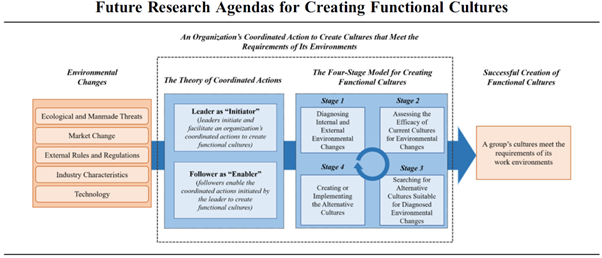I am a social and organisational scientist investigating culture creation, artificial intelligence, and creativity in both organisational and medical contexts.
Our current research focuses on:
Culture creation and change – how can medical organisations create functional cultures?
Culture, defined as the common values and assumptions shared among group members, is one of the most popular topics in social science. Numerous studies have shown that culture influences our psychology and behaviours, giving us a comprehensive understanding of its power in shaping us. However, the antecedents of culture—how cultures are created and changed—have received far less scholarly attention. My research aims to address this gap both theoretically and empirically.
In our theoretical paper, we propose two theories for creating functional cultures as shown in the Figure below. The theory of coordinated action defines the roles of leaders and members in the process of culture creation and change. The four-stage model outlines a step-by-step approach for building cultures that help organisations and teams enhance their effectiveness. Our team currently aims to (1) empirically test the theories we proposed in medical organisations and (2) further develop and refine these theories.
Excerpted from Kim, Toh, and Baik (2022, Journal of Management).
Applications of Artificial Intelligence in Organisational and Medical Contexts
Our research centres on the integration of artificial intelligence (AI) within organisational and medical contexts, emphasising the dynamics of human-AI collaboration. We aim to understand how AI can enhance creativity, facilitate learning, and improve patient interactions.
In organisational contexts, we explore whether human-AI co-creation can produce more creative outcomes than human efforts alone. Our studies demonstrate that initial collaborations between humans and AI yield higher levels of creativity compared to solo human endeavours. However, this advantage diminishes over multiple rounds; individuals working independently show continuous improvement in creativity, whereas human-AI teams maintain a consistent level without augmented learning. This stagnation appears to result from human participants' overreliance on AI's generative capabilities, leading them to invest less effort in idea development and refinement during collaboration with AI.
In the medical contexts, our research examines patients' reactions to medical outcomes involving AI and investigates how AI can be seamlessly integrated into medical practices. For example, we investigate whether patients respond more positively or negatively to medical failures attributed to a doctor, AI, or a doctor-AI collaboration. Furthermore, we explore how patients moralise AI—assigning moral qualities to artificial agents—and how this affects their acceptance of AI-provided advice and suggestions. Our work also identifies situations in which patients prefer interacting with AI agents over human doctors during consultations.
Through these investigations, we aim to unravel the complexities of human-AI interactions and their implications for creativity, learning, and patient care. By understanding the conditions that enhance or hinder effective collaboration with AI, we hope to contribute to strategies that optimise AI integration in both organisational and medical environments.
I am highly motivated to collaborate with medical institutions and professional companies on these topics, as well as on broader issues of organisational behaviour in medical contexts.
Group name
The Human-AI Research Group in Medicine and Organisations
Group members
Dr.Jungmin Choi, Senior Research Associate - j.choi@jbs.cam.ac.uk
Pengzhao Lyu, PhD student - pl539@jbs.cam.ac.uk
Yingyue Luan, PhD student - yl665@jbs.cam.ac.uk



